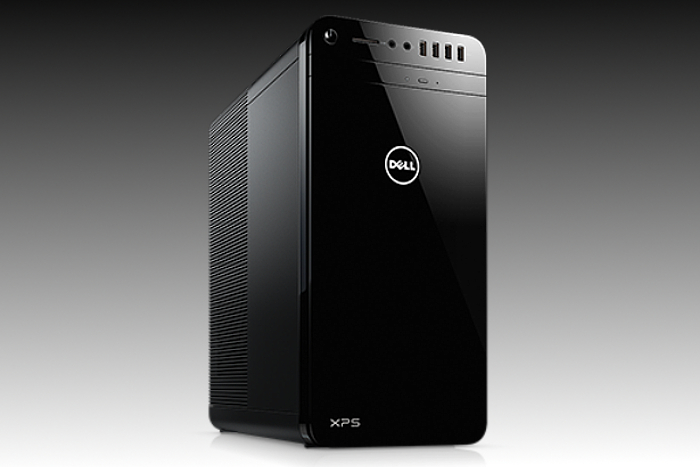
Interestingly enough, the latter two systems aim at VR gaming, but according to Dell, the Special Edition model is the only one tested and approved for the Oculus Rift and HTC Vive Optimized certification programs. The base XPS Tower is aimed at students needing power for system-intensive applications (and some PC gaming too).
“Thanks to inspiration drawn from the Alienware Aurora’s clever engineering, unique PSU (power supply), and tool-less design, with a simple pull of a lever you can now swap and upgrade graphics cards and processors in the XPS towers with ease,” Azor reports.
The base XPS Tower desktop is offered with four configurable starting points ranging from $700 to $1,300. The base configuration consists of an Intel Core i5-6400 processor, 8GB of DDR4 system memory clocked at 2,133MHz (64GB maximum), Nvidia’s GeForce GT 730 with 2GB of DDR3 video memory, a 1TB hard drive (7,200RPM), Bluetooth 4.2, and Wireless AC connectivity.
According to the specs, customers can choose to install the GeForce GTX 745, the GTX 750, the GTX 960, the GTX 970, the newer GTX 1070, and the latest GTX 1080 across all four configurations (nope, there’s no AMD GPU here). This desktop also comes with a Dell KB216 wired keyboard, a Dell laser mouse, and the 64-bit version of Windows 10 Home.
As for the XPS Tower VR model, this version is served up in only three tasty flavors ranging from $1,100 to $1,800. The base configuration is similar to the non-VR XPS Tower model save for the discrete graphics card, which is a beefier Nvidia GeForce GTX 970 with 4GB of GDDR5 video memory. Thus, at first look, customers are seemingly paying an extra $400 just for the GTX 970 upgrade.
If you’re wanting a meatier VR configuration, the $1,800 starting point consists of an Intel Core i7-6700K processor, 16GB of DDR4 system memory clocked at 2,133MHz, the GeForce GTX 970 graphics card, a 2TB hard drive, a 32GB M.2 SSD, Bluetooth 4.2, and Wireless AC connectivity. All models sport a gigabit Ethernet port, so don’t panic about having to rely on spotty wireless networking while playing online.
As for ports, the VR model provides plenty. On the front, you’ll find four USB 3.0 ports, one SD card reader, a microphone jack, and a headphone jack. On the back there are three USB 3.0 ports, one USB 3.1 port, two USB 2.0 ports, one USB 3.1 Type-C port, audio ports, one DisplayPort connector, and one HDMI port. That doesn’t even include the outputs provided by the discrete video card.
“Did we mention that it produces virtually no sound?” Azor adds. “The XPS Tower is quiet as a whisper, employing thermally controlled fans that spin only as fast as critically needed, so there are no distractions from the game that you are playing, movie you’re watching, or music you’re listening to.”
Unfortunately, the specs for the XPS Tower Special Edition aren’t currently listed on Dell’s website. However, we highly doubt the company will cram Nvidia’s freshly-baked Pascal-based GeForce Titan X into this system. That, we’re betting, will be saved for the Alienware line.
Editors' Recommendations
- The best Meta Quest 2 games
- You can now buy the experimental & sleek Dell XPS 13 Plus
- The best Oculus Rift games
- You can now buy Dell’s new XPS 17 laptop, starting at $1,400
- You can now buy Dell’s new slim-bezel, near-perfect 2020 XPS 13 laptop



